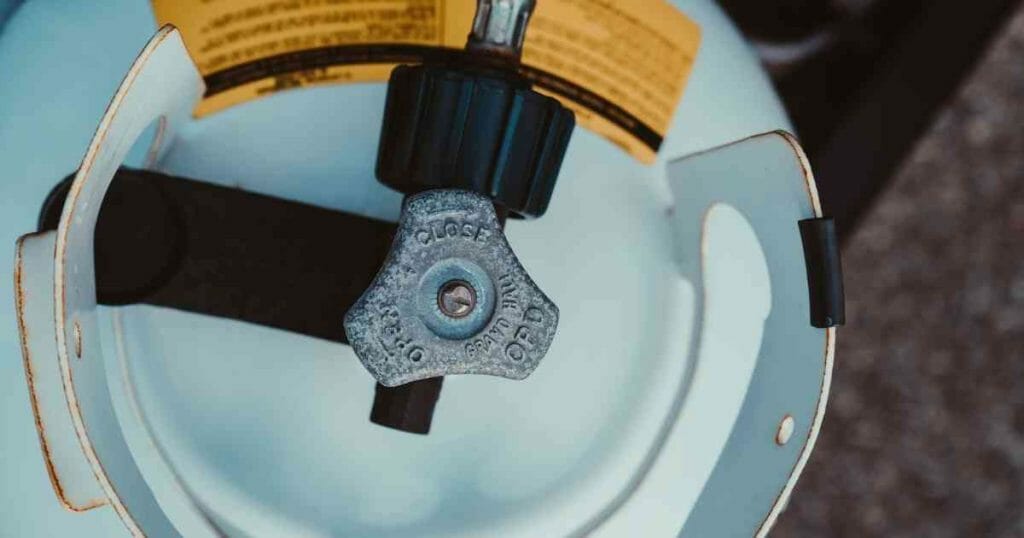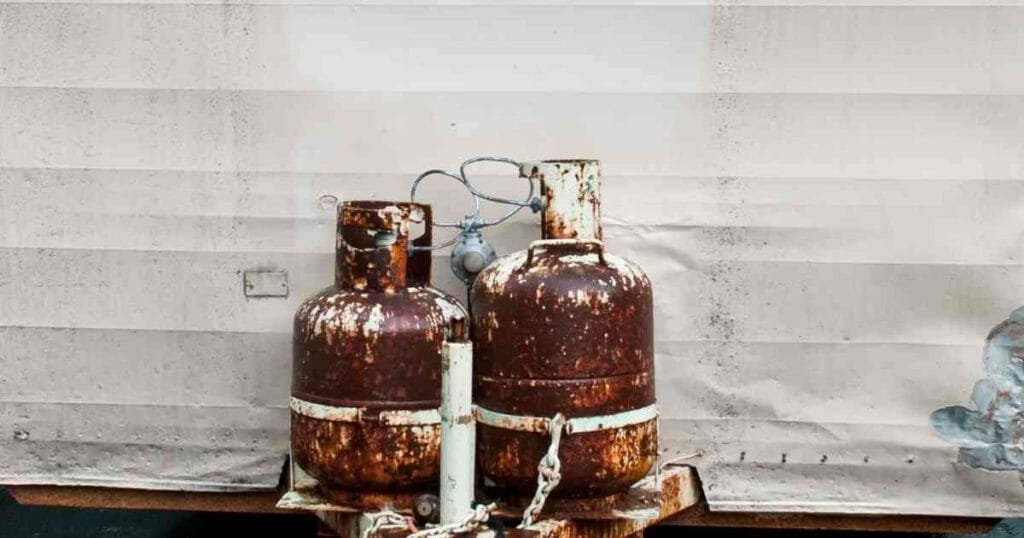This post contains affiliate links.
If you have an RV with propane appliances and tank, then you may be familiar with the unpleasant experience of a propane tank leak. While a small leak may not seem like a big deal, it can actually be quite dangerous. Leaks in your RV propane tank can pose serious safety hazards. Not only can leaks lead to fires or explosions, but they also cost you money in the loss of propane.
A propane leak will smell like rotten eggs. By spraying or brushing soapy water on all the propane fittings and looking for bubbles the leak can easily and quickly be detected.
If you’re an RV owner, then you know that propane tanks are a core piece of your essential onboard systems. They provide the fuel for your stove, furnace and other appliances and allow you to cook food while on the road. But what do you do if your propane tank starts leaking? In this blog post, I will show you how to detect and repair a propane tank leak.
Table of Contents
5 Ways to Detect a Propane Leak

Leaks in propane tanks can be notoriously difficult to pinpoint. If you suspect that your propane tank has a leak, it is important to take action immediately. Here is how you can detect a propane tank leak:
Propane Smell
One way to tell if your RV has a propane leak is by the smell of propane. While propane gas is naturally odorless, in order to make it easier to detect leaks, a harmless chemical called mercaptan is added to give the gas its distinctive “rotten egg” smell.
However, propane leaks can also occur in places where you can’t smell them. If you suspect that there may be a propane leak, but you can’t find the source, there are a few other methods of detection that you can use.
Soapy Water For Detecting Leaks
The easiest and most popular way to detect a propane or any type of air pressure leak is by using soapy water.
- Mix some liquid dish soap with water in a dish or spray bottle, I prefer a spray bottle because it is easier to apply.
- Once mixed, spray or brush the soapy water onto any fittings and connection points one at a time while watching for bubbles. Small bubbles will appear anywhere there is propane leaking.
- Use wrenches to tighten the fittings in any location where bubbles occur.
- Apply more soapy water and repeat until no bubbles are created. The leak should now be sealed.
Finding Leaks With A Propane Detector
Sometimes a leak can occur without any obvious signs. In these cases, it’s important to have a propane leak detector on hand like the Y201 with a flexible neck and alarm. These devices are designed to sound an alarm when they detect the presence of propane, giving you time to ventilate the area and take action to prevent a fire.
Propane detectors are battery-operated and can be portable or mounted on walls or ceilings. Some models also include a digital display that shows the level of propane gas in the air.
In addition to being an important safety precaution, a propane leak detector can also help you save money by alerting you to leaks so that you can repair them before they cause significant damage.
- DETECTS A WIDE RANGE OF COMBUSTIBLE GASES: Accurately detects gas leaks from methane (natural gas), propane, butane, ethanol, alcohol,...
- FLEXIBLE SENSOR NECK FOR HARD-TO-REACH AREAS: This propane and natural gas leak detector features a 12-inch bendable gooseneck probe that...
- VISUAL & AUDIBLE GAS LEAK ALARMS: Equipped with a loud 85 dB alarm and 6 LED indicators to show the presence and concentration of gas....
You’re Running Out of Propane More Quickly
If you notice that you are running out of propane more quickly than usual, it may be an indication that there is a leak in your system.
A simple way to check is to turn off all your propane appliances or switch them over to the electric setting like your refrigerator.
Take a reading and picture of your propane tank pressure gage and wait an hour or longer then check again to see if the pressure has decreased on the pressure gage. If the pressure is lower there is likely a leak in your propane system.
I recommend that you keep notes on how much propane you are using so that you can identify any unusual patterns.
DSI Error on Appliances
Another common sign of a propane leak is an error code on your water heater or refrigerator. If using propane, a Direct Spark Ignition (DSI) is required in order for the appliance to operate. A DSI error message will appear on the display if the Ignition Source is not compatible with propane.
If you see an error code on one of your appliances, it’s important to take immediate action and determine the source of the leak.
Propane appliances like your RV fridge can be difficult to start or not operate to their full potential. For help check out my recent article on how an RV propane refrigerator works and tips to keep it cold.
How to Repair a Propane Tank Leak in Your RV
A propane leak in your RV can be a dangerous situation. If you detect propane, it is important to take immediate action to avoid a fire or explosion. Here are steps to take if you discover a propane leak in your RV:
- Immediately turn off the propane tank. This will stop the flow of gas and prevent further leaks.
- Turn off all appliances that use propane, including the furnace, water heater, stove, and fridge.
- Ventilate the area by opening all doors and windows. This will help to dissipate the gas and reduce the risk of fire or explosion.
- Call a qualified technician to repair the leak. In the meantime, do not attempt to repair the leak yourself. Propane is highly combustible, and even a small spark can cause an explosion.
- Have the technician check the entire propane system for leaks before turning the gas back on. This will ensure that all leaks have been fixed and that the system is safe to use.
Taking these steps will help ensure your safety and prevent further damage to your RV.
How Dangerous is an RV Propane Tank Leak?
RV propane tanks are a common sight at campgrounds and on road trips, but few people know how dangerous they can be. Although propane is a relatively safe fuel, leaks can occur and it is important to take immediate action to avoid the risk of fire or explosion.
Propane is a hydrocarbon gas that is stored under pressure and is widely used as a fuel for grilling, cooking, and heating. It is also used as an automotive fuel and in some engines as a replacement for gasoline. Propane is a colorless, odorless gas that is highly flammable and can explode if not used properly.
While it is an efficient and affordable fuel source, propane also poses a serious safety risk.
- Propane is highly flammable, and even a small spark can ignite a blaze.
- Propane gas can cause asphyxiation by displacing oxygen in the air. If there is a propane leak, it is important to leave the area immediately and call for help. Inhaling even a small amount of propane can result in dizziness, nausea, and vomiting. In severe cases, it can lead to unconsciousness and death.
- Propane gas is also heavier than air, meaning that it will settle in low-lying areas. This makes floors and other enclosed spaces particularly dangerous in the event of a leak.
For these reasons, it is important to be familiar with the dangers of propane and take steps to avoid accidents.
Causes of RV Propane Tank Leaks

The most common cause of RV propane tank leaks is faulty valves. If the valves are not properly sealed, gas can escape. Another cause of leaks is damage to the tank itself. If the tank is punctured or cracked, gas will leak out. Overfilling the tank can also put stress on the walls of the tank, causing them to rupture.
Another common cause of these leaks is corrosion of the metal valves and fittings. Over time, the metal may corrode and break down, allowing propane to leak out. Finally, an improper connection between the tank and the RV can also lead to leaks. If the hose or fittings are loose, gas will escape.
I share the best ways to troubleshoot issues with your RV propane fridge in my article called Troubleshoot an RV refrigerator: Recharge, Repair, or Replace.
RV Propane Safety Precautions
RV propane is a safe and reliable way to power your RV, but there are a few safety precautions you should take:
- Make sure you know how to properly shut off the propane supply in case of a leak.
- Never store propane cylinders inside your RV – they should be kept outside in a well-ventilated area.
- Only use RV propane appliances that are specifically designed for RVs – never try to use a standard home propane appliance in your RV.
- Keep your propane tanks topped off when camping in the winter.
- Always make sure that the area around your RV is well ventilated when using propane. This will help to prevent the build-up of dangerous fumes.
- Always keep a fire extinguisher close at hand when using propane. This will help to ensure that any fires can be quickly extinguished.
- Remove the appliance access covers annually for inspection and cleaning.
- Use a propane gauge to find out how much propane you have.
- Have your RV’s propane system regularly serviced by a qualified technician. This will help to ensure that it is running safely and efficiently.
Following these simple safety precautions will help to make your RVing experience safe and enjoyable.
Final Thoughts
RV propane tank leaks are serious business. Not only can they be dangerous, but they can also be expensive to repair. If you own an RV, it’s important to know how to detect and repair a propane tank leak. The good news is that there are a few simple steps you can take to detect and repair leaks.
However, when it comes to RV propane tank leaks, the best offense is a good defense. By regularly inspecting your tanks and lines for signs of wear and tear, you can catch potential problems before they cause serious damage. With a little care and maintenance, you can help ensure that your tanks will provide safe and reliable service for many years to come.

